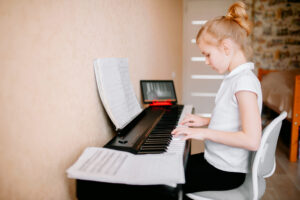 Learning a new instrument can be a wonderfully rewarding process and the piano especially presents such versatility of repertoire and styles. If you are thinking of enrolling yourself or your child in Seattle piano lessons, there are three things you can do before starting to ensure success during lessons and practice: get a keyboard or piano, establish a daily practice time, and decide what you want to achieve by enrolling in lessons.
Learning a new instrument can be a wonderfully rewarding process and the piano especially presents such versatility of repertoire and styles. If you are thinking of enrolling yourself or your child in Seattle piano lessons, there are three things you can do before starting to ensure success during lessons and practice: get a keyboard or piano, establish a daily practice time, and decide what you want to achieve by enrolling in lessons.
Keyboard or Piano?
The first and most important step is to make sure you have a keyboard or piano accessible to you. There are plenty of reasons for choosing an electric keyboard over a piano, or going the traditional route and learning on an acoustic piano. The most obvious deciding factor is the price of the instrument. Electric keyboards can be bought for as little as $100, while basic acoustic upright pianos will cost several thousand dollars depending on the condition and model of the instrument.
Many people choose to buy a keyboard to start off with and once they are a few years into lessons, they then consider investing in an acoustic piano. If you decide to go the keyboard route, you should plan to spend at around $250-$350 to get a basic keyboard that you will enjoy practicing on and that will not develop any mechanical problems. If you already have a family acoustic piano or are interested in purchasing a beautiful new instrument, the experience of playing an acoustic instrument cannot be paralleled and you will love the rich sound.
If you are interested in being able to experiment with cool synthesized sounds, a keyboard could be an excellent choice for you, but if you are more interested in having an instrument capable of expressing subtle nuances needed for classical piano repertoire, a traditional piano would be more your style.
Establish a Practice Time
The next thing you have to do to ensure success once you or your child starts piano lessons, is to establish a daily time to set aside for practicing. I once heard an interview with a famous piano player who got up every morning to practice for two hours at 6am when they were growing up, but that sort of practice schedule would never have flown in my household! Be realistic about what time will work best for your practicing. From high school through college, I always practiced first thing in the afternoon once my classes and sports were over because I was still in a focused zone and was ready to switch gears and make some music.
You can try different piano practice schedules at first. Once you’ve figured out what works best for you, be sure that you stick to your schedule and your household is in agreement with the designated practice time. You should treat your practice time like an important meeting you have to attend every day, or a special class you are taking and need to prepare for. Kids need to know that their noisy and imperfect practice is not an inconvenience to anyone, so encourage them to stick to their schedule and put in the time!
Know Your Goals and Inspirations
Finally, before you enroll in piano lessons, think about why it is that you want to learn to play this instrument in the first place. Did you see an inspiring video of a concert pianist playing some dazzling virtuosic piece that you want to learn to play someday? Do you want to jam to your favorite pop songs or movie themes for fun in your own time? Are you looking for a creative outlet after years of telling yourself that you wish you had the time to learn to play an instrument? Once you know the answer to this question, it will also help you decide whether you want to learn on a keyboard or piano, and once you get an instrument that you enjoy practicing on, it will make you all the more excited to stick to your daily practice schedule!
When you meet your new Seattle piano teacher, talk with them about your goals and aspirations for learning to play the piano. If you want to take a strict, regimented course steeped in theoretical knowledge and traditional repertoire, they will be happy to lead you that direction. If you want to have a more informal style, choosing new tunes here and there, they can surely accommodate that as well. In fact, you may be surprised by how well these two paths naturally converge and enrich each other.
Ready to Start Lessons?
If you or your child is ready to start piano lessons, don’t hesitate to ask us to help find a teacher and lesson time that works for you. At Lessons In Your Home, our instructors are thoroughly vetted, professional, and passionate about music. Our teachers will come right to your home for every lesson, plus we offer virtual music lessons, too. Our online music lessons are being taught by local music teachers with live lessons tailored to your child! Contact us today to learn more.
By Natalie Bartels
